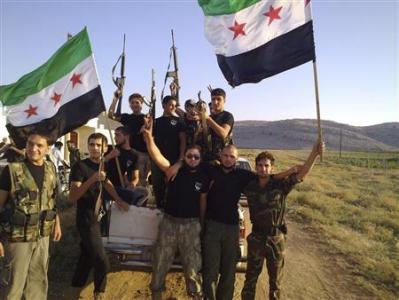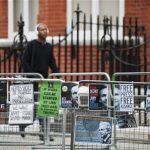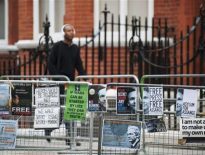(Reuters) – President Bashar al-Assad controls less than a third of Syria and his power is crumbling, his former prime minister said on Tuesday, in his first public appearance since he defected to the opposition this month.

Riyad Hijab told a news conference in Jordan that the morale of Syrian authorities was low after grappling for 17 months to crush a popular uprising and an armed insurgency against Assad.
“The regime is collapsing, spiritually and financially, as it escalates militarily,” he said. “It no longer controls more than 30 percent of Syrian territory.”
Hijab, a Sunni Muslim, was not in Assad’s inner circle. But as the most senior civilian official to defect, his flight after two months in the job looked embarrassing for the president.
Hijab did not explain his estimate of the territory still controlled by Assad, whose military outnumbers and outguns the rebels fighting to overthrow him. The army is battling to regain control of Aleppo, Syria’s biggest city, after retaking parts of Damascus that were seized by insurgents last month.
Curbs on media access make it hard to know how much of Syria is in rebel hands, but most towns and cities along the country’s backbone, a highway running from Aleppo in the north to Deraa in the south, have been swept up in the violence. Assad has also lost swathes of land on Syria’s northern and eastern border.
While the military focuses on Damascus and the business hub of Aleppo, rebels have slowly made gains in Syria’s tribal heartland to the east, where a ferocious fight is under way for Deir al-Zor, capital of the country’s main oil-producing region.
Army gunners shell Deir al-Zor, an impoverished Sunni city near the Iraqi border, from fortified outposts in the desert.
A Western diplomat who follows the Syrian military said rebel forces in Deir al-Zor were fragmented but that the military lacked the numbers and supply lines to defeat them, in a region producing all Syria’s 200,000 barrel a day oil output.
Jubilant rebels said they had shot down a Syrian jet fighter southeast of Deir al-Zor and captured its pilot on Monday. The government blamed the crash on technical problems.
ISLAMIC COLD SHOULDER
Assad also faced deeper diplomatic isolation over his violent crackdown on opposition with the planned suspension of Syria from the Saudi-based Organisation of Islamic Cooperation (OIC), a step opposed by his Shi’ite ally Iran.
He will view the OIC decision, to be adopted at a summit of the 57-member body in Mecca, as the work of supporters of the Syrian opposition such as Saudi Arabia, Qatar and Turkey.
Splits among big powers and regional rivalry between Iran and Saudi Arabia have stymied diplomatic efforts to halt the bloodshed in Syria, where opposition sources say 18,000 people have been killed. The British-based Syrian Observatory for Human Rights said more than 45 died on Tuesday and 180 the day before.
The violence, now focused on the city of Aleppo but flaring in many other areas, has displaced 1.5 million people inside Syria and forced many to flee abroad, with 150,000 registered refugees in Turkey, Jordan, Lebanon and Iraq, U.N. figures show.
U.N. emergency relief coordinator Valerie Amos arrived in Syria to discuss aid for civilians trapped or uprooted by the fighting, which has frequently prevented the delivery of food and medical supplies.
“She’s there to express her grave, grave concern over the situation,” spokesman Jens Laerke said. “She will look at the situation on the ground and discuss with the government and humanitarian partners how to scale up the response in Syria.”
Efforts to arrange ceasefires to let relief convoys through have rarely worked. A U.N. official said last month the Syrian authorities had often denied visas to Western aid workers.
In Aleppo, Syria’s biggest city and its economic dynamo, food is running short and has become far more expensive. State-run groceries that sold heavily subsidized staples have shut. In the Bustan al-Qasr district, hundreds of men lined up for bread.
“CATCH MY TOMATOES”
At a makeshift hospital, one doctor said some people were arriving seeking food rather than medicine.
Another doctor described a man who had been shot in the foot while carrying home food for his family. He was more worried about losing his groceries than about his wound. “He started crying: ‘My food, my food, someone catch my tomatoes’.”
Amos went to Syria in March to seek unhindered access for aid workers to badly-hit areas. Damascus agreed to a joint but limited humanitarian assessment, but bureaucracy and insecurity have foiled U.N. efforts to launch a significant aid operation.
Reuters journalists in Aleppo heard shelling and explosions in Saif al-Dawla district, next to the Salaheddine neighborhood which has seen some of the heaviest fighting in the last two weeks. One rebel fighter was killed by tank shelling, his bloodied body dragged out of the line of fire by comrades.
“We received some simple amounts of ammunition but it is not enough,” said rebel fighter Hossam Abu Mohammad, a former army captain. “We need specific kinds of (anti-tank) weapons.”
“We are about 600 Free Syrians fighting in Salaheddine and it is not enough,” he told Reuters.
Assad is struggling to keep power, relying on military and security forces led by members of his minority Alawite sect, an esoteric offshoot of Shi’ite Islam. They are combating a deadly insurgency that emerged after a crackdown on peaceful anti-Assad protesters mostly from Syria’s 70 percent Sunni majority.
Iranian President Mahmoud Ahmadinejad is likely to take up the cudgels on Assad’s behalf at the two-day Mecca summit that may highlight the rift between the Shi’ite Islamic Republic and Sunni-ruled nations that want the Syrian leader to step down.
Saudi Arabia and Qatar are believed to be paying for arms that reach Syrian rebels via Turkey to try to counter the superior firepower of Assad’s mostly Russian-armed military.
Russia and China, which have blocked any U.N. Security Council action on Syria, firmly oppose any outside intervention in Syria, but Beijing is trying to show a “balanced” approach by developing contacts with the opposition as well as Damascus.
Bouthaina Shaaban, a senior adviser to Assad, arrived in Beijing but did not speak to reporters. She will meet Chinese Foreign Minister Yang Jiechi, the foreign ministry said.
“China is also considering inviting Syrian opposition groups in the near term to China,” ministry spokesman Qin Gang said.
Shi Yinhong, a professor of international relations at Renmin University, said China’s willingness to meet Syrian opposition groups differed markedly from Russia’s attitude.
“The Syria government is more vulnerable than before. The opposition groups have gained newfound support from the West, but they’re also fragile. China has a pressing need to talk to the two sides. The situation now is nearing an end,” he said.
(Additional reporting by Tom Perry, Erika Solomon and Mariam Karouny in Beirut, Khaled Yacoub Oweis in Amman, Stephanie Nebehay in Geneva, Ben Blanchard in Beijing and Asma Alsharif in Jeddah; Writing by Alistair Lyon; Editing by Jon Boyle)





